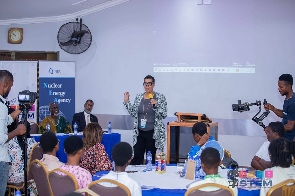 The workshop was organized by the Paris-based International Organization, the Nuclear Agency (NEA)
The workshop was organized by the Paris-based International Organization, the Nuclear Agency (NEA)
An international mentorship workshop to encourage senior high school (SHS) girls in science, technology, engineering, and mathematics (STEM) has taken place at Aburi.
The two-day workshop, the first of its kind in sub-Saharan Africa and the twenty-first in the world was organized by the Paris-based International Organization, the Nuclear Agency (NEA), with assistance from the Nuclear Power Institute of the Ghana Atomic Energy Commission (GAEC).
Distinguished female scientists and policymakers from Ghana and overseas mentored 46 SHS girls selected from 17 public and 3 private schools across seven regions of Ghana. "Inspiring young females in STEM careers for a better tomorrow" was the theme of the workshop.
The Deputy Assistant Secretary for International Nuclear Energy Policy and Cooperation of the U.S. Department of Energy, Ms. Aleshia Duncan, intimated that the workshop aims to help address the under-representation of women in the field of STEM, especially in the nuclear energy sector, and to enhance female leadership and visibility in the sector.
She urged the girls to be bold and committed to their goals and endeavour to accomplish them. “Be strong, make bold choices for your life, and accomplish the task at hand. Say yes to opportunities and embrace the challenges that may come your way. Giving up is not an option,” she said.
Ms. Duncan, who is also the Chairperson for the International Framework for Nuclear Energy Cooperation (IFNEC), encouraged them to be change agents and to lead the transformation agenda for a better society. “The world needs people like you to develop advanced nuclear reactors and innovate other technologies to help solve societal problems,” she added.
The Director-General of GAEC, Prof. Samuel Boakye Dampare, underscored the need for an inclusive and equitable education that requires creating a welcoming learning environment, particularly for girls, and encouraging them to pursue all academic disciplines, even those perceived as difficult, such as STEM.
“An effective career counselling system, staffed by well-trained professionals, is crucial for students, particularly girls, to overcome fears and gain confidence for success in STEM fields,” he stated.
Prof. Dampare charged the girls to become Maria Salomea Skłodowska-Curie, the first female chemist to win the Nobel Prize in 1903 and the only one to win it twice for her groundbreaking studies on radioactivity that shaped the very foundations and concepts of nuclear science.
“Back home, we can talk of Prof. Jane Naana Opoku Agyeman, a professor of literature; Prof. Rita Akosua Dickson, a phytochemist; and Prof. Nana Aba Appiah Amfo, who were or are the first female vice-chancellors of leading universities in Ghana,” he said.
“You can achieve anything in life once you are dedicated to your studies, work hard, persevere, focus, and are diligent. Also, make good use of the limited resources available and aim to give it your best shot,” Prof. Dampare added.
The Director-General of NEA, Mr. William D. Magwood IV, has also said that about 3 billion people will be living in Africa in 2050. As a result, it is crucial and incumbent that Africa be part of the industrial future, which is the only way to have highly trained people, including women.
“Among these highly trained people, we are going to have women play a very strong role. This mentorship workshop, thus, is planting seeds for the future. It aims to cultivate women's future roles in fields like energy, engineering, healthcare, and other fields where nuclear technology is important. If you believe in the future, you have to believe in programs like this because these girls are the future,” he explained.
“My message to women is that they should follow their hearts, dreams, and talents, and maximize their skills to make the world a better place, as not doing so cheats both themselves and the world,” he added.